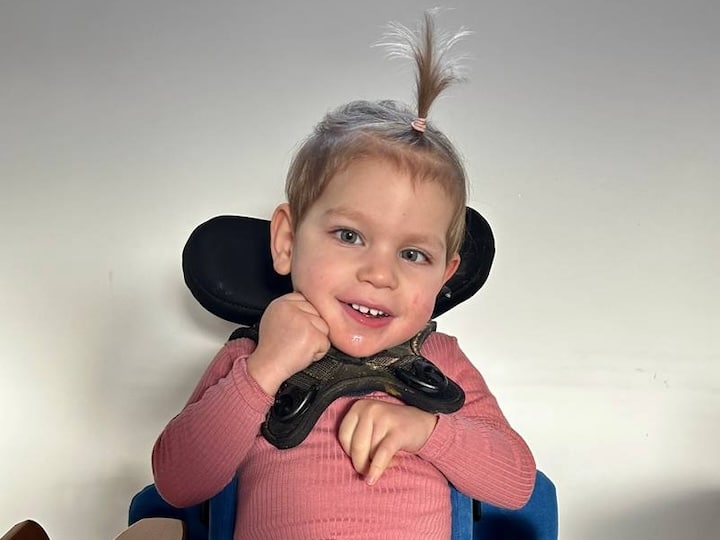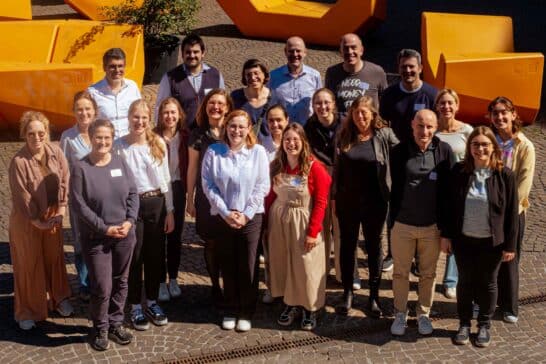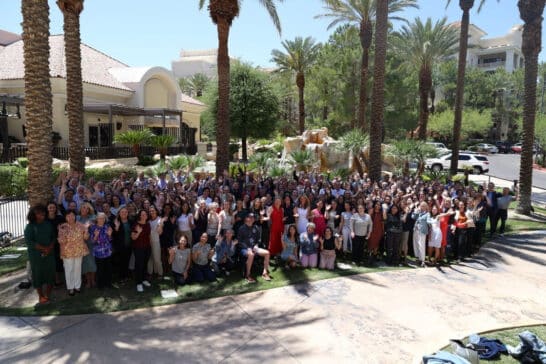„You can do so much more than you think“
Anna from Germany talks with love about her family’s journey, her son Ole, and her sick daughter Nele. She tells of a quietly lingering fear of the future and sleepless nights, but most importantly of lots of support, love and a wonderful time together
Dear Anna, who is in your family?
We are Jens (36 years old), Anna (36 years old), Ole (5 years old) and Nele (4 years old).
Tell us a bit about yourself and your family.
Other than spending time with our family and friends, we enjoy outings, club activities, traveling, growing our garden and relaxing at home.
Jens works full-time in a cryogenics company and I work 60% in a consulting firm. Our kids are both in kindergarten. Nele attends a kindergarten for children with physical disabilities.
Ole and Nele share a very strong bond, Nele doesn’t radiate such joy around anyone else. They both like to be active, the rougher the better, and Nele is always in the thick of it.
We live a perfectly “normal” life. Maybe a little different than the “normal” we imagined before Nele, but to us it’s completely normal and good now.
How did you PCH2 journey start?
They first suspected something shortly after Nele was born. She was physically stressed and had difficulty drinking, causing her to lose weight. While she was in hospital, no cause could be found. She had several x-rays of her head, but nothing was ever found to be wrong. At home, everything settled down well. Nele mostly felt comfortable and slowly put on weight.
However, she didn’t take any further developmental steps – no grasping, no eye contact, still a very tense posture, her hands mostly clenched into fists, and she was still eating very slowly.
After nine months, an MRI was done. When we were told the diagnosis, it was brief and not very empathetic.
“Your child will probably not live longer than two to four years.” We were not prepared for this statement. It was tough. The diagnosis was then confirmed by a blood test.
How did you feel during that time? What helped you and what was the most difficult?
After the diagnosis, the doctors sent us home with very little information. Dr. Google, who we don’t normally consult, was our only source of information.
This led us straight to the PCH Family website, which was an amazing stroke of luck. In addition to this great platform with wonderful people and helpful information, our families and friends also helped us.
Our pediatrician and the Lebenshilfe association were also very supportive.
The time immediately after the diagnosis was very difficult emotionally. We cried a lot together, had many serious discussions and quickly tried to return to normality.
We all managed to do this quite well together, especially thanks to Nele, because she simply is the wonderful person that she is!
What are Nele’s symptoms?
– fewer, not age-appropriate developmental steps (“few” does not mean “none”!)
– alternating reduced and increased muscle tension
– reduced head circumference
– impaired perception (can make eye contact, but with delay)
– aspiration (of food or saliva) leading to strong coughing
– sleeping difficulties / restlessness from time to time
Her perception has improved greatly over the last few years, she responds very strongly to certain people now.
On the other hand, her sleeping has become somewhat worse.
Which symptoms do you consider the most difficult for you and Nele?
Currently the sleeping issues. Nele often takes a long time to fall asleep and wakes up several times during the night.
As for the rest, we consider it to be fine and completely within Nele’s normality.
Part of this feeling of normality is certainly the fact that Nele fortunately does not (yet) need any medication, has no seizures and can be fed with puree.
What helps you to manage your daily life as a family? Where do you get support?
We are grateful that we can lead a fairly normal life at the moment, including kindergarten and two jobs. We have found a good rhythm for our daily life.
Most of the support we receive comes from our social environment, which accepts Nele as completely normal. We haven’t noticed anyone treating her differently so far. Everyone is very loving with our little girl and engages with her.
The grandparents also look after our children regularly. We have two volunteer women who support us during the school vacations, which is wonderful.
Which tools do you find helpful for yourselves and Nele?
It’s been a long journey, but Nele now loves riding in the car and her buggy. That’s why we wouldn’t want to miss out on our sporty stroller and the rotating car seat. We also have a seat attachment for excursions and travel which is easy to take along. We travel a lot and it works really well.
Nele has a therapy chair, a model that ironically bears the name “Nele”. It is height-adjustable, so she can always be at eye level.
Nele loves showering on her reclining shower chair.
At kindergarten, she uses a stand-up aid and a tricycle.
What are the greatest challenges you face in daily life?
Our biggest challenge at the moment (apart from the lack of sleep) is dealing with the fear of new challenges that Nele’s increasing age and weight will bring.
Nele’s grandparents are an integral part of Nele’s care, but of course it won’t get any easier physically.
It could also happen at any time that the volunteers might no longer be available, for example. We worry about this often.
I also find the increasing instances of offensive staring towards our girl challenging. They always make me feel uneasy. This is normal human behavior, you try to be understanding – but there are days when it hurts a little more because it shakes up the perceived normality.
But for the time being, we are doing very well in life and are mostly happy.
What does a normal day in your family look like?
Ideally, one of us gets up before the kids and prepares everything. We take turns looking after the children in the morning, which means that one of us goes to the office and the other cares for the children, takes them to kindergarten and then returns to home office.
We pick the children up again between 12:30 and 3:30 p.m.
After Nele’s afternoon nap, it is off to Ole’s activities (gymnastics, soccer, friends), Nele’s occupational therapy, to visit friends or relatives together, or we stay comfortably at home.
In the evening, we eat a warm dinner together, play some more games, take a shower every few days and at 7 p.m. the children go to bed.
Can you tell us about your favorite moments as a family?
Birthdays are always a big highlight. Nele’s birthday in particular, as we celebrate each year with extra joy and gratitude. Our mindset has changed since the diagnosis.
We regularly go on vacation with friends, visit Brittany (France) with our extended family every two years and have recently started to enjoy staying in family hotels in the mountains.
Last year, we spent 3 weeks with relatives in Canada and the USA – it was a really exciting, relaxing and fascinating time that showed us that many things are possible – and much more than that!
I particularly remember the “HotPot” experience Nele had with her dad – both with huge smiles on their faces. After that, my husband immediately began researching whether he could get Nele one of these hot tubs for the garden.
I hope we can maintain this normality and continue with the activities as Nele grows up.
What has changed over time and how are you doing as a family today?
We’re doing great, which is probably due to the fact that Nele is doing great.
The biggest change compared to the early days is our acceptance of the situation and the fact that we rarely feel sad or scared any more.
For us and the people around us, life with Nele is absolutely normal and good the way it is. This is probably why we rarely regard our child as “sick” or “different” – we simply live our life as normal as it is now.
Is there anything you wish for Nele?
We sincerely hope that Nele can continue to live a happy and mostly content life as she has done for a long time.
Why is Nele someone really special?
Nele has strongly influenced our perspective on many aspects of life. She has sharpened our focus on the essential things in life and all the little moments of joy. We take less for granted.
At the beginning, we were given a very minimal developmental outlook but Nele has already proven us wrong several times. We enjoy every smile of hers and every little step our little girl takes. And we are certain that she is leading a good and happy life!
We also feel real love from Nele, but also for Nele from those around us. That is very special to us!
What advice would you like to give to the parents of a child who has just been diagnosed with PCH2?
You can do so much more than you might think right after the diagnosis!
There is a lot of first-hand information here. You are not alone! There are people who have had the same feelings, who know your grief and your fears for the future.
Our goal from the start was to live as normally as possible and fortunately we are able to do that very well. But that of course depends on the child’s situation, including their happiness and how fine-tuned their medication is.
But whenever possible, striving to be normal is helpful and beneficial in my opinion.
„You can do so much more than you might think right after the diagnosis!“
(Anna)
Share Your Own Story
to support and encourage other families on their journey.


